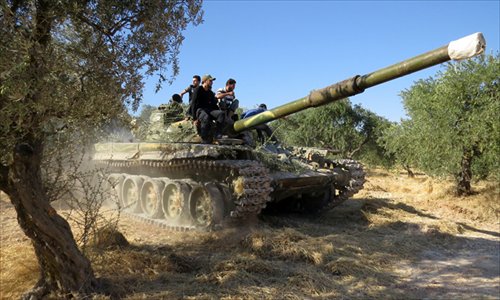Syria accepts handover of chemical weapons

Rebel fighters sit on top of a tank that formerly belonged to the Syrian army during a battle with government forces in the rebel-held northwestern Syrian province of Idlib on Monday. Syrian President Bashar al-Assad warned Washington to brace for retaliation if US forces attack his war-torn country. Photo: AFP
Syrian Prime Minister Wael al-Halki Tuesday said his country has agreed a Russian proposal for Damascus to give up chemical weapons to avoid possible US military strikes. The US said the option of military action remains on the table.
Russia is working on an "effective, clear, concrete" plan for putting Syria's chemical weapons under international control and is discussing the details with Damascus, Foreign Minister Sergei Lavrov said on Tuesday.
Syrian Foreign Minister Walid al-Muallem Tuesday in Moscow confirmed that the Syrian leadership agreed with the Russian initiative, after a meeting with the speaker of the Russian lower house of parliament.
This came after Russia Monday announced a plan for Damascus to place chemical weapons under international control and then to have them destroyed.
The White House said Tuesday that the US will engage allies on how serious Syria is about surrendering its chemical weapons, but stands by its drive to muster support for possible military action.
President Obama will take some credit for a possible diplomatic breakthrough on Syria's chemical weapons stockpile in an address to Americans on Tuesday, but will keep pushing Congress to approve military force, White House spokesman Jay Carney said.
Obama has agreed with his French and British counterparts to probe Russia's plan to defuse the Syria chemical weapons crisis at the United Nations on Tuesday, a US official said.
The discussion will test the viability of the plan with a view to enshrining commitments in a Security Council resolution, the official said.
The US Senate may not vote this week on the authorization for the use of military force in Syria, congressional aides said on Tuesday.
"Russia's proposal offers a step for Obama to postpone military strikes," Zhang Zhizhou, a research fellow with the School of International Relations and Diplomacy of Beijing Foreign Studies University, told the Global Times, adding that the US president didn't have a firm determination on taking the military action.
"Syria would get an opportunity to bargain and it would require an equivalent offer from the US side," said Zhang.
Chinese Foreign Ministry spokesman Hong Lei said Tuesday that China welcomed the Russian proposal to push Syria to place its chemical weapons under international control and called on the international community to "actively consider" the suggestion.
He also confirmed that a six-member delegation of the opposition Syrian National Dialogue Forum started its visit to China on Tuesday. It is one of China's efforts to push for a political solution to the Syrian crisis, Hong said.
An international relations expert in Damascus, surnamed Ibrahim, told the Global Times that China and Russia have promoted a political solution for the ongoing Syria crisis in the international community and the West has been in a passive position, this has reduced the possibility of the US military action.
Britain Tuesday gave a cautious welcome to the Russian proposal but said Damascus must make a "serious and genuine" offer to eradicate its stocks.
France said Tuesday it would submit a resolution to the UN Security Council calling on Syria to put its chemical weapons beyond use or face "extremely serious" military reprisals.
Britain would back any "credible" UN Security Council resolution on Syria's chemical weapons program, but it must contain the threat of force, British Foreign Secretary William Hague said Tuesday.
Arab states of the Gulf Tuesday renewed calls for the UN to take "deterrent measures" against Syria's government and said that Russia's chemical arms plan won't stop the bloodshed in Syria.
Agencies contributed to this story